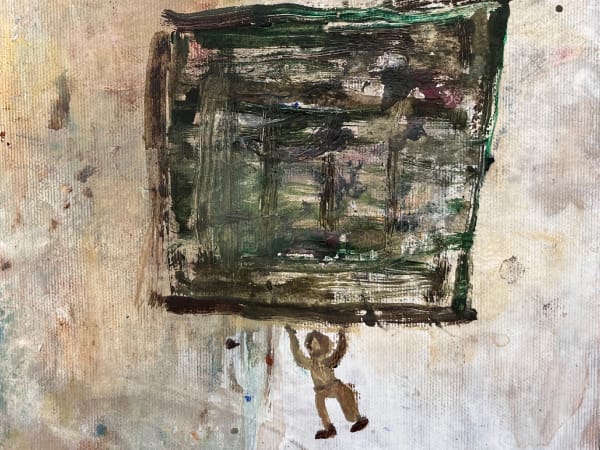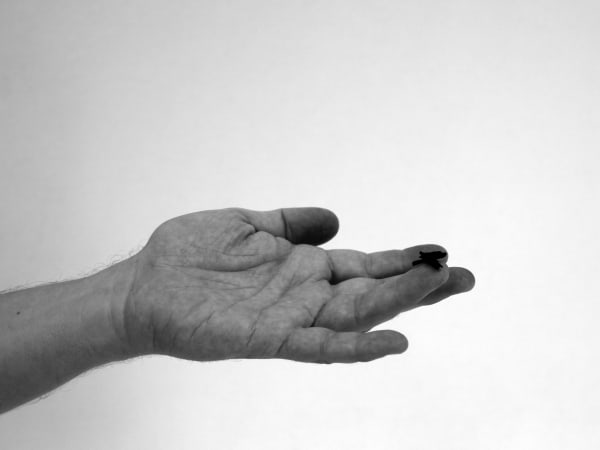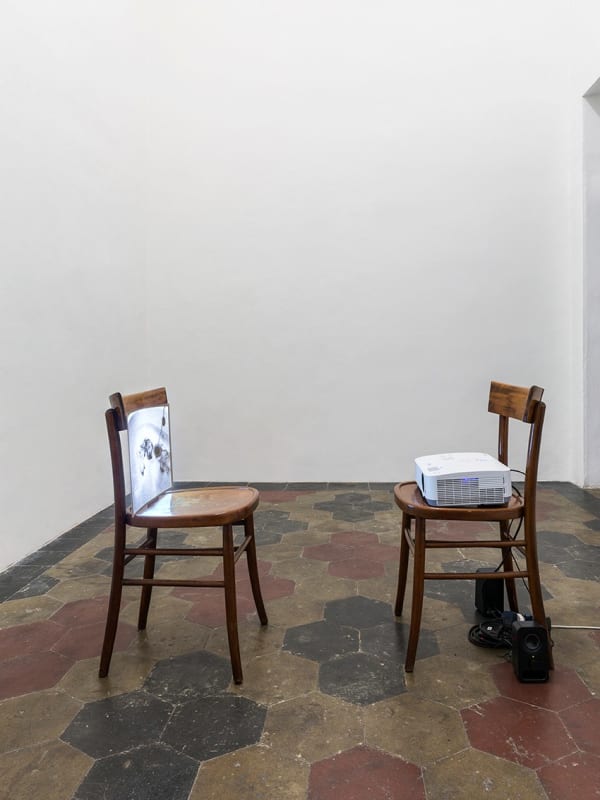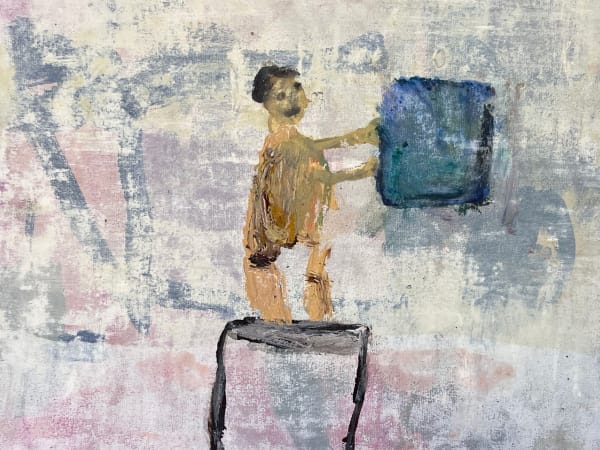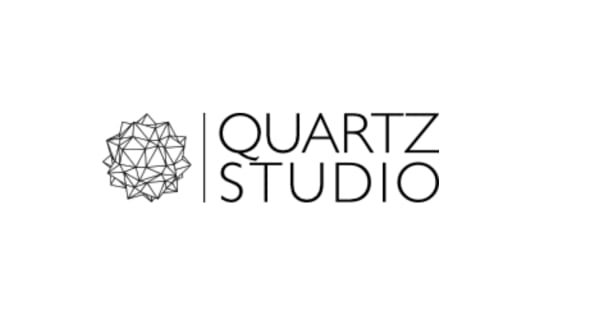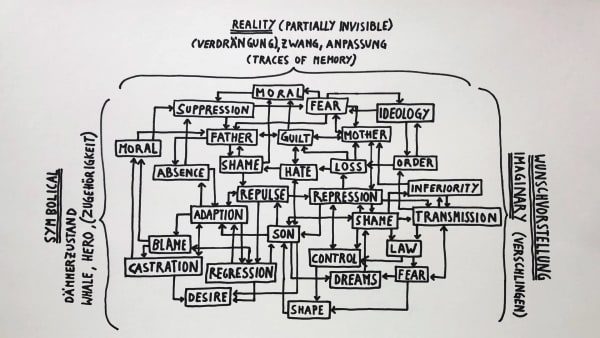Works
Biography
Gernot Wieland (b. 1968, Horn, Austria) is a filmmaker and artist whose work spans short films, drawings, photographs, installations, and lecture-performances. His narratives are constructed through idiosyncratic and often absurd combinations of images and language, blending autobiographical and fictional elements into poetic, dreamlike spaces. Wieland constructs a deeply emotional and singular world where memories hover between truth and fiction. His first-person narratives weave together the personal with the political and slowly develop into a humourous analysis of social norms and repressive dynamics.
On a visual level, his work collages diverse techniques, including drawing, Super 8 sequences, diagrams, clay animation, potato printing, and watercolor. These methods are as approachable and personal as the content they convey. Wieland’s plots unfold like dreams, merging past and present, and connecting figures from his childhood—teachers, classmates, or family members—with cultural icons such as Sigmund Freud and Jackson Pollock. Wieland’s universe is suffused with a Kafkaesque tension, where psychoanalysis, social norms, and repression intersect with humor and gentleness. His work reveals the scars of oppressive institutions, rigid educational systems, and fragile neuroses, delicately unraveling their impact like origami. His visual and narrative techniques invite viewers into a poignant and unsettling world, where incongruity and emotion pulsate in unison. In this world, therapists become trapped in their own memories, unable to hear their patients, while Kafkaesque authority figures dissolve “like ink in milk” (the title of his 2018 film). Through play-dough figures, crayon-colored landscapes, and absurd diagrams, Wieland crafts surreal narratives held together by a sharp, otherworldly lucidity. With candor and delicacy, he examines the fractures, dislocations, and vulnerabilities of the human condition, crafting a narrative and cinematic language that is both extraordinary and profoundly moving.
Gernot Wieland (b. 1968, Horn, Austria) completed his education at the University Of Fine Arts, Vienna (1996) and the University of Fine Arts, Berlin (1997). His selected recent solo exhibitions include You do not leave traces of your presence, just of your acts, Künstler:innenhaus Bremen, (Germany2024); Square, Circle, Square, Argos centre for audiovisual arts, Brussels (Belgium, 2023); Halb Nackt, Belmacz, London (UK, 2023); Turtleneck Phantasies, Kindl – Centre for Contemporary Art – M 1 VideoSpace, Berlin (Germany, 2022) and …like ink in milk, Virtual Video Space – Berlinische Galerie, Berlin (Germany, 2021). He has participated in recent group shows in institutions such as Castello di Rivoli (Torino, 2023); Torrance Art Museum (Los Angeles, 2022); SCCA Center for Contemporary Art Ljubljana (Slovenia, 2022) ; Kunstmuseum Bonn (Germany, 2021); Kunstmuseum Olten, Olten (Switzerland, 2020); Hong-Gah Museum, Taipei (Taiwan, 2020); BIENALSUR - 3rd International Biennial of Contemporary Art of South America, Buenos Aires (Argentina, 2021); Centre d´art Pasquart, Biel/Bienne (Switzerland, 2018); Künstlerhaus Bremen (Germany, 2018); Kasseler Kunstverein, Kassel (Germany, 2018); Latvian Center for Contemporary Art, Riga (Latvia, 2017); 9th Norwegian Sculpture Biennial, Vigeland Museum, Oslo (Norway, 2017) and Musée du chateau des ducs de Wurtemberg, Montbéliard (France, 2016). The MAMC+ / Musée d'Art Moderne et Contemporain, Saint-Etienne (France) will devote a solo exhibition to his work in 2025, accompanied by the publication of a book co-edited by THE PILL and published by JBE Books.
Gernot Wieland’s 2024 film, The Perfect Square, was selected for the 74th Berlinale - Berlin International Film Festival - Forum Expanded, Berlin, and at First Look 2024, Museum of the Moving Image, New York. His films have won numerous awards: Aus-Blicke at the Blicke, Filmfestival, Bochum, (Germany, 2023); main prize in the German competition at the 69th International Short Film Festival, Oberhausen, (Germany, 2023); Best Film Award at the Festival des Cinémas Différents et Expérimentaux in Paris (France, 2022); honorable mention at the Cannes Shorts Film Festival, Cannes, (France 2022); Special Mention at ARKIPEL - Jakarta International Documentary and Experimental Film Festival, (Indonesia, 2021); Best Film Award, VIII Kinodot Experimental Film Festival, St. Petersburg (Russia, 2020); EMAF Media Art Award from German film critics at the EMAF - European Media Art Festival, Osnabrück (Germany, 2019); special mention at the 36th Short Film Festival, Hamburg, (Germany, 2019); he was the winner of the 20th MOSTYN Open, Llandudno (Wales, 2017).
Press
Texts / Portfolio
Videos
News

